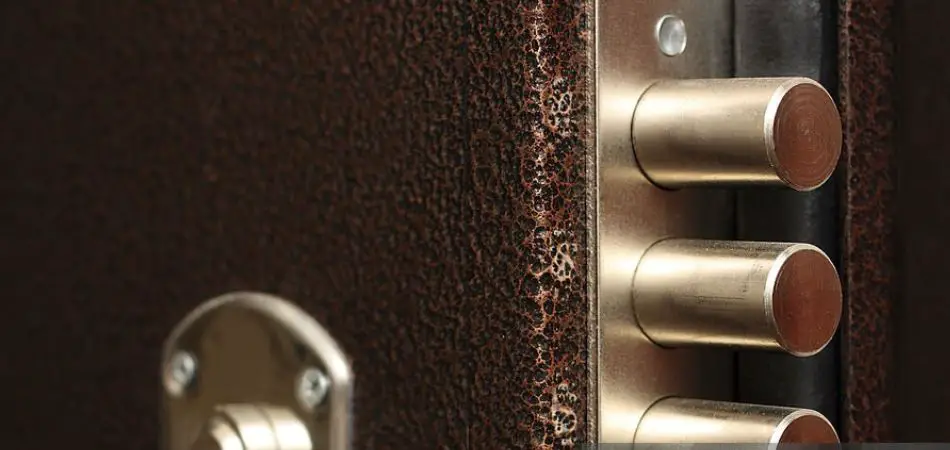A good security door combines strong materials with advanced locking systems. Durability and tamper resistance are key features.
Home safety is paramount, and selecting the right security door is vital for ensuring peace of mind. Robust materials like steel or reinforced aluminum form the backbone of a top-notch security door, providing a formidable barrier against intruders. These doors often include features such as heavy-duty locks, deadbolts, reinforced frames, and impact-resistant designs.
A security door not only deters potential break-ins but also adds to the aesthetic appeal of your property with various styles and finishes available. Optimal security doors blend with your home’s architecture while offering maximum protection. Look for doors with enhanced security features like multi-point locking systems and drill-resistant plates, ensuring the safety of your home and loved ones.
Key Features Of A Good Security Door

Begin blog post section
A good security door is not just a barrier. It is a shield for your home’s safety. The best ones blend sturdy construction, tech-savvy features, and visual appeal. Let’s dive into the key features that define a top-quality security door.
Subheading Durable Materials
Durable Materials
Materials used in a security door must withstand force and weather. Steel and aluminum are top choices for their strength and resistance to rust, respectively. Some doors combine materials, adding wood for a classic look without compromising security. The thickness of the door and its frame also contribute to durability.
Table Illustrating the Comparison of Materials
| Material | Strength | Weather Resistance |
|---|---|---|
| Steel | High | Medium (requires coating) |
| Aluminum | Medium | High |
| Wood (in combination) | Medium | Medium (requires treatment) |
Subheading Advanced Locking Mechanisms
Advanced Locking Mechanisms
Security doors are only as effective as their locks. Look for doors with multi-point locking. These spread the locking points across the door frame. Deadbolts and electronic locks also contribute to a door’s integrity. Electronic locks might include features like keypads, biometric scanners, or smart technology.
Unordered List of Lock Types
- Deadbolts
- Electronic locks with keypads
- Biometric scanners
- Smart locks with remote control
A door’s ability to keep intruders out is its most critical function. These features ensure a door does just that, keeping your home and family safe.
End blog post section
Design Elements
When thinking about the ultimate security door for a home, one should look beyond just strength and durability. ‘Design Elements’ play a crucial role in merging security with style. The right design can make a security door not only a barrier against threats but also a pleasing addition to the house’s aesthetic.
Let’s dive into the details of what makes a security door not just strong, but visually appealing too.
Aesthetically Pleasing
A security door doesn’t have to resemble a fortress gate. Today’s market offers doors that blend safety and style. High-quality materials such as wrought iron or powder-coated steel bring elegance to these doors. They come in designs from classic patterns to modern motifs, fitting any home’s character.
Think about choosing colors that match or complement your home’s exterior. The goal is to ensure the door adds to the curb appeal while being an impenetrable guard.
Customization Options
The power of personal choice transforms a standard door into a ‘your’ security door. Customization options are abundant. Choose from different lock types, handle designs, and accessories such as peepholes or mail slots. Shape and size adjustments can make sure your door fits perfectly in its intended space.
Screen inserts can offer additional ventilation and viewing capabilities, tailor-made for each homeowner. A unique door, customized to individual tastes, ensures that your haven is as unique as it is secure.
Security Standards And Certifications
Security standards and certifications are crucial when selecting a good security door. Trustworthy doors should meet stringent industry criteria to ensure optimal protection. Below, we’ll discuss key compliance measures and recognitions that set high-quality security doors apart.
Compliance With Industry Standards
A good security door doesn’t just look tough; it has the credentials to prove it. Compliance with industry standards confirms a door can withstand common burglary tools.
- ASTM International: They set global safety standards for materials and products.
- ANSI: This is a private non-profit that oversees the creation of consensus standards in the United States.
Quality doors should pass impact tests, burglar resistance, and even fire ratings. These tests simulate real-world break-in attempts, ensuring doors can protect homes effectively.
Certifications To Look For
Certifications act as a seal of approval from recognized bodies. They verify that a security door meets or exceeds specific safety standards. Here’s a list of certifications homeowners should seek:
| Certification | Description |
|---|---|
| UL Certification | Underwriters Laboratories test products for public safety, a crucial endorsement for security doors. |
| ISO Certification | International Organization for Standardization confirms a manufacturer’s quality management systems. |
Seek doors with security ratings like Secured by Design or that adhere to the Police’s Preferred Specification. These indicate a product’s effectiveness in deterring crime.
Installation And Maintenance
Ensuring the security of your home begins with the right door, but it doesn’t stop there. Installation and maintenance are pivotal to a security door’s effectiveness. Proper installation can mean the difference between a door that defends and one that fails. Regular, simple maintenance keeps the door functioning at its peak. Let’s delve into what these processes involve.
Professional Installation
Professional installation ensures your security door fits perfectly and functions as intended. Certified technicians assess the doorway, align the door accurately, and secure it with the correct hardware. This precision prevents gaps and weak points that compromise safety.
| Step | Detail |
|---|---|
| 1. Measure | Technicians measure the doorway to ensure an exact fit. |
| 2. Align | The door is carefully aligned with the door frame. |
| 3. Secure | High-quality locks and hinges are installed. |
| 4. Inspect | A final inspection confirms secure fitting and operation. |
Easy Maintenance Tips
Security doors require ongoing care to maintain their strength. Easy maintenance tips help you keep your door in top shape. Follow these simple steps:
- Clean regularly to prevent debris build-up in moving parts.
- Check locks and replace them if they show signs of wear.
- Oiling hinges ensure smooth operation and no creaks.
- Inspect seals for signs of damage to weatherproof your home.
If you encounter issues, seek professional help promptly. Timely repairs prevent larger problems and enhance door longevity.
Cost Considerations
When looking at security doors, the price tag can often reflect the door’s quality and features. Yet, it’s crucial to consider both your current budget and long-term investment. A good security door should secure your home without draining your wallet. Let’s explore cost considerations.
Balancing Quality And Budget
Finding the sweet spot between quality and cost is key. Invest in a door that provides solid security features within a reasonable price range.
- Materials: High-quality steel or aluminum costs more but offers better protection.
- Locks: Multi-point locks heighten security. They may have a higher upfront cost.
- Brand: Established brands with good reviews can be more expensive. They typically deliver better performance and longevity.
Avoid the cheapest options as they might not provide sufficient security. Invest wisely for durable protection.
Long-term Value Vs. Initial Investment
Purchasing a security door can be viewed as an investment. Consider the long-term benefits over the initial price.
| Consideration | Benefit |
|---|---|
| Durability | Longer-lasting doors won’t need frequent replacements. |
| Security Features | Better security reduces the risk of a break-in. |
| Energy Efficiency | Doors with insulation features can lower energy bills. |
Weighing long-term savings against upfront costs often tips the balance in favor of investing more initially. A quality door pays for itself through the years with the security and savings it provides.
The Bottom Line
Choosing the right security door involves balancing strength, style, and safety. Opt for materials and locks that meet your security needs. Regular maintenance ensures lasting durability. Your peace of mind is invaluable; invest in a security door that offers that.
Remember, a robust door is your home’s first defense line.







